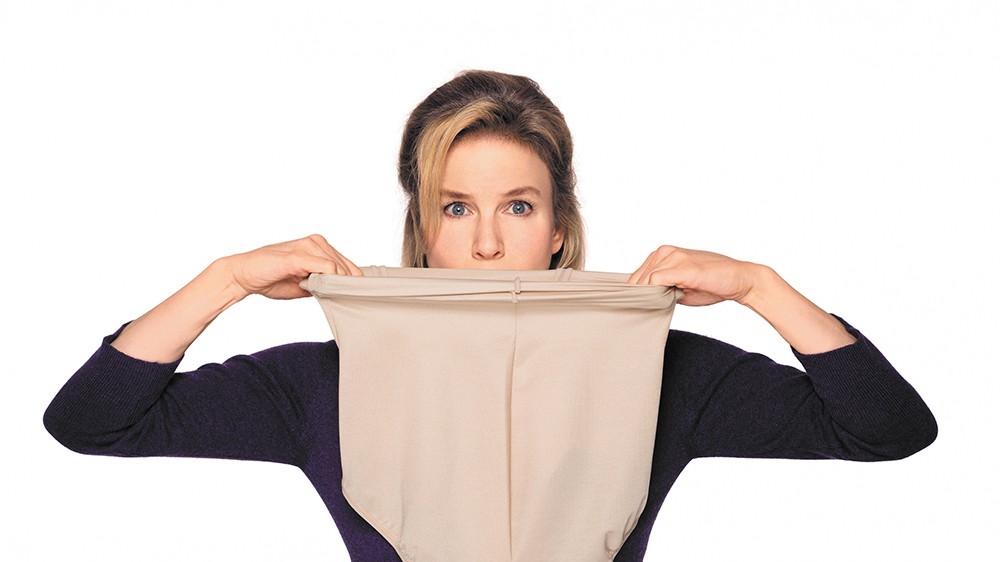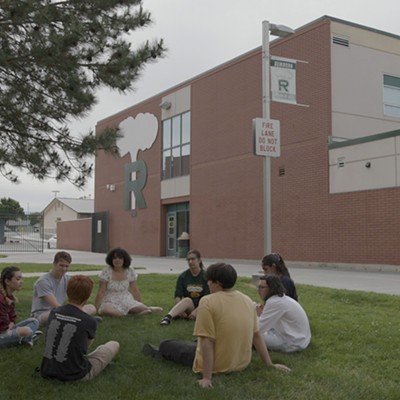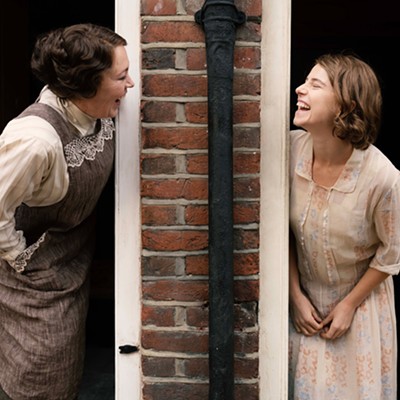A goofy meme has taken hold among a certain segment of the "Film Twitter" community, one that pokes fun at an archaic convention in broad comedies: the "record scratch/freeze frame." The joke is on movies employing obvious indicators that wacky things are afoot, but it's an idea that seems more like urban legend than reality. Surely movies — even those of a bygone era where people actually knew what a "record scratch" was — didn't really use the record scratch as storytelling shorthand for "wait, whaaaaat?"
It was with a mix of incredulity and grudging admiration that I watched Bridget Jones's Baby director Sharon Maguire — returning to the series' director's chair after overseeing the original 2001 Bridget Jones's Diary — deploy not one, but two such record scratches, which the franchise certainly has done previously. Bridget Jones herself may have aged a decade as this story unfolds, but the movie itself feels almost proudly stuck in the vibe of a late 1990s/early 2000s romantic comedy, with all the accompanying formulaic (and only sporadically satisfying) shenanigans.
The setup alone feels like the kind of high concept that went out with flip phones. Bridget (Renée Zellweger) is still a singleton in London as the story opens, as regularly frustrated with her personal life as she is successful at her job as a TV newsmagazine producer. But at the age of 40-something, an unexpected complication enters her life. Bridget is pregnant. And since nothing about her personal life could possibly involve simple solutions, the father could actually be one of two people. Was it Jack (Patrick Dempsey), a millionaire online-dating mogul with whom she had a one-night stand at a music festival? Or was it Mark Darcy (Colin Firth), the on-again/off-again flame who re-entered her life after he separated from his wife?
If you noticed the absence of Hugh Grant from this incarnation of a Bridget-based romantic triangle, that's because his Daniel Cleaver has been written out of this installment, and the loss is a significant one. Even in the often-excruciating Bridget Jones: The Edge of Reason, Grant's Cleaver gave a naughty spark to a story that was often based in how many humiliations Bridget could bounce back from. Dempsey's Jack brings none of the same insouciance, resulting in a situation where he and Firth's Darcy are two basically decent guys bumping awkwardly against one another, rather than providing genuine friction. Only a small role for Emma Thompson (also co-credited with the screenplay, along with Jones author Helen Fielding) as Bridget's obstetrician provides anything close to the same edgy energy. There's more humor in one of her withering glances than in most of the rest of the movie.
That's because Bridget Jones's Baby is far less interested in offering new jokes than in breaking out a greatest hits collection of everything audiences might have once adored about the bumbling, unlucky-in-love-and-everything-else Bridget and her movies. You can bet that there will be at least one occasion in which Bridget's rear end is embarrassingly the center of everyone's attention, and that she will babble her way ineptly through some public speaking occasion. Even more reliably, this latest installment continues the series' impressive tradition of using the single most obvious pop-song music cue for literally every occasion. If you expected Bridget to jump around to anything besides "Jump Around," or to interact with an Italian restaurateur to anything besides "Mambo Italiano," or to have her oddball double-dads situation scored to anything besides "We Are Family," then you just don't know these movies very well.
Of course, those who do know these movies very well are mostly interested in revisiting Bridget's life, and Zellweger — even without the trademark added weight she carried in the earlier movies, explained away early in the narration — still knows how to give the character an earthy appeal. But her life and her problems belong in another era — one where movie heroines have sassy gay BFFs to offer advice, and one that demands a traditional resolution to Bridget's eternal quest for a "happily ever after." We need more stories about the interior lives of women past the age of 40, but it helps if those stories don't already feel obsolete, where you're more ready to chuckle at what comes after the record scratch than at the record scratch itself. ♦


















